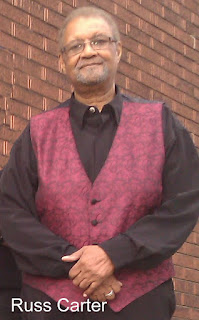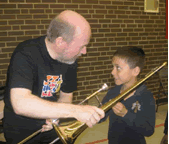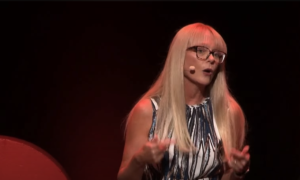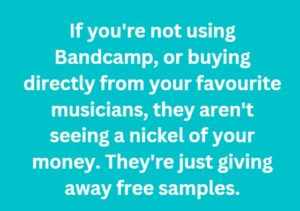What could possibly bring a seventyish year old guitarist back on stage ready to wail on his axe? With so many younger players facing exhaustion and discouragement from time on the road, hauling gear and disappointment in the business, Russ Carter is getting revved up all over again. What makes a man like this tick?
It’s good to see. It’s a kick in the butt. We need musicians like him to give us a healthy perspective and to present us with the positive side of how things are possible in this business. After all, when you’ve been playing
for over fifty years as a professional, you must have some pretty reliable principles guiding you!
for over fifty years as a professional, you must have some pretty reliable principles guiding you!
Russ Carter has a few extra challenges that younger musicians may not face. His old band mates are long gone, and Russ misses them dearly. A hand injury disabled his left hand, forcing him to re-teach himself his fret board technique with only three good fingers working. And, while trying to land work in Hamilton for the sake of his present band mates in the Russ Carter Unit, he’s living an hour and a half out of town in Newcastle, Ontario. No ordinary guy. It’s well worth the time to find out what makes him tick.

Based on my conversations with Russ Carter, I’ve seen that he is using four smart tactics when engaging with the Hamilton music scene. Check them out.
Smart Tactic Number One: Set your standard as a professional.
“Musicians are their own worst enemy when they play for little or nothing. They allow the standard to be lowered. If good bands agreed to not play for peanuts, then the lower quality bands would get weeded out,” Carter says. Good bands mean good entertainment and therefore more customers for venues. Music fans aren’t stupid. They will come again to see a good band, and venue operators will book a band that they know, and that their customers have come to enjoy.
Fact: Some bands will play for $20 or $30 per person just to stay together. They’ll take any amount just so they can play somewhere. They forget that other musicians are relying heavily on getting a decent pay for their work. It’s their livelihood.
Fact: Music can be purchased by venues cheaply, like a commodity, for very little money, or even for free (commercial radio).
Fact: A good booking agent can help you be a better professional. By ensuring that his bands fulfill a high standard of musical performance, balance, volume, stage behaviour and appearance, an agent can be your best partner in helping the venue operator see what you’re worth.
Still, many venue operators fail to see why they should pay you at all, let alone a decent professional fee of, for example, $100 per person. They will try one type of music one week, hiring the cheapest band they can find, then switch to a different band the next week. Carter says, “Mixing up genres is problematic, because you get no established crowd.” The result is no consistency and no opportunity for the venue and the band to build a regular clientele.
If you can advocate for yourself in this way without an agent, fine. Go ahead. Soon you’ll notice that you are spending time forging new relationships and partnerships.
Smart Tactic Number Two: Be ready to forge new partnerships.
Fact: The Bishops were one of only a few bands back in the sixties, and there were many venues (The Grange, The Flamingo, The Golden Rail, The Brass Rail, and The Jet to name a few). Each man earned $200 for a night’s work.
Fact: We are in the opposite situation now; there are many bands and fewer venues.
Fact: Deejays and karaoke have cut into our live music opportunities.
Therefore, band leaders have to think carefully about where their music can be offered as an added value to a venue operator. A good band leader should be pursuing relationships with places that haven’t got live music but may benefit from it. Carter proposes that it may be possible to get an agreement to play for several weeks in a row. “You may take a cut in pay, but set up four or five jobs. Then you can get your posters and materials out and spread the word. It’s not just like play and they will come. You have to work at it.” He believes that when bands jump from place to place, they wrongly assume that their fans are willing to follow them. Not likely. People are creatures of habit.
Smart Tactic Number Three: Do the hard work.
Get off your ass. Make that phone call. Visit that venue. Put up the posters. Follow up on the hunch. And get your product perfected. Your product is your music. Hold rehearsals. Get tight. Learn new repertoire so that you’re always fresh. And when you’re on the gig, look like a pro and act like a pro. Keep the beers off stage. Dress like you’re an entertainer. And if one of the band members doesn’t like it…
| Thank goodness for goodness. It’s what makes this profession work |
Smart Tactic Number Four: Leave a happy trail.
This is the part that makes magic. It is such an amazing thing when people choose the good because people are important. Don’t bad mouth. Look for ways to help others out. Honour your word and do what you’re paid to do.
I am proud to call Russ Carter my friend. In the few months I’ve known him, he has only brought good things to me. There is a sense of openness and trust and gratitude that stands out. Thank goodness for goodness. It’s what really makes this profession work. Don’t you agree?





